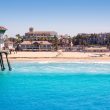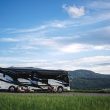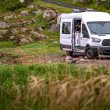Whether you’re boondocking, trying to keep the kilowatt cost down, or going green, there’s plenty of sensible and easy ways to save energy while camping in your RV. From motoring down the road, to parking with a purpose, to being water-wise, you can cut your camping bills, extend your resources, and go easy on the environment.
Before you Go
Perform regular maintenance on your RV or towing vehicle before heading out. Replace or clean air filters and be tuned up and in good working order. Be sure tires are fully inflated
for safe and fuel-efficient travels. Shed unnecessary supplies, accessories and “stuff” before heading out; remember you’re getting away from it all; not carrying the weight of the world in your RV.
Repair and replace the seals around windows and doors before heading out. Improve your RV’s ability to maintain a comfortable temperature by upgrading insulation where possible.
Check batteries before leaving home. Worn out batteries will make the inverter struggle and be much less efficient to operate. New batteries will pay off in energy savings.
On the Way
Even the lightest, most aerodynamic RV won’t be able to claim it’s a gas saver, but an RV vacation will still have less impact on the environment than an airplane trip, according to the Recreational Vehicle Industry Association. Also, newer designs with lighter materials have added miles to each tank of gas. If you’re driving an older, heavier RV, consider upgrading to a newer “ultra-lite” model with the same amenities and comfort in a much lighter package. Make the trip to your next adventure as energy efficient as possible.
Once you’ve lightened the load, remember to go slow and see everything. Speed and rapid acceleration lower fuel economy. Let cruise control keep your ride steady, and use overdrive to slow down the engine while going uphill to be fuel efficient.
Making Camp
Be energy wise at your camp site starting at the beginning. If it’s summer, ask for a heavily shaded lot. According to the U.S. Department of Energy shade can reduce the temperature as much as 9 degrees, easing the work of fans and air conditioners. Open vents and windows to capture cool evening or morning air, but use shades and home-made or purchased blocks for vents during the heat of the day. Keep air circulating with low-energy draw fans
.
Camping is about the great outdoors, so stay outdoors. Use your grill – charcoal or gas – to do all your cooking and spare the energy cost of running electric appliances – or the drain on your batteries if you’re dry camping – or boondocking.
Heating water not only uses a lot of energy, if you’re dry camping, it drains the fresh water tanks and fills the grey water. Consider adding a simple outdoor solar shower set up to your camping gear if going off the grid is part of your regular camping routine. A 5-gallon solar shower bag left out on the picnic table will provide enough hot water for a quick camp shower. If you’re at a full-service campground, save the energy — don’t add heat and humidity to your unit — and use the bath house.
For hearty winter campers, ask for a site that takes advantage of any sun, but is protected from freezing winds. Consider adding insulating window coverings between shades and the glass. Reflectix
screens are a popular choice that substantially increases the energy efficiency of your RV. Budget RVers can try sheets of bubble wrap on windows to trap heat inside. A must-have investment to keep energy costs in check is skirting for around the bottom of your RV; cold floors do more than torture bare feet, they drive up energy costs. Keep the cold winds from settling under your RV, and set up skirting
– either designed for your RV or made with plywood — for cold weather camping.
Wrap water lines in insulated pipe wrap to save on energy costs and get hotter water faster when it’s cold.
What keeps the heat out, also keeps it in. Consider replacing factory installed window coverings with insulated curtains to keep the chill from penetrating to the inside of your RV. In the summer, insulated curtains will keep the hottest rays of the sun from heating up the interior of your RV.
Energy-Wise
Like any brick-and-mortar home, be aware of how you’re using energy. On a cloudy day, it’s easy to fall into the trap of leaving on lights, keeping the coffee warming, working with your laptop plugged in to charge, heating up a quick snack, and standing before an open refrigerator door looking for the perfect treat. If you’re off the grid and on a generator, or sipping at batteries, every bit of energy matters. If you’re paying by the watt at an RV resort, you could wind up with an expensive surprise at checkout. Turn lights off, keep the refrigerator closed, and charge then unplug.
If it’s an available option, heat water just before a shower – and make showers brief – or use the camp ground facilities. Run heaters and air conditioning units first thing in the morning and last thing at night and let sun or shade do their work in the middle of the day.
Consider solar
If boondocking, or camping off the grid, is part of your regular plans, consider installing solar panels. While the investment may seem daunting at first, it’s the best and easiest way to save energy while camping. Low maintenance and easy to operate, solar energy can generate cost free energy anytime the sun shines – and store energy for days when it doesn’t.






